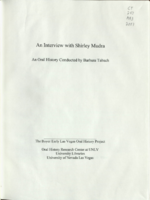Search the Special Collections and Archives Portal
Search Results

Transcript of interview with Byron Underhill by Joyce Moore, March 20, 2002
Date
Archival Collection
Description
Byron Underhill's father owned the first Coca-Cola bottling plant, the first beer distributorship, and the first bowling alley in Las Vegas. Byron moved here from Needles, Calif., with his family in 1927. Byron later took over the bottling plant, served in the Army as an aircraft mechanic and a glider pilot during World War II, was a private pilot who worked with Search and Rescue, played in various bands, and suggested to the Lions club that they found a burn unit at University Medical Center that is still the only one in the state
Text

Alexander Zapata interview, February 15, 2020: transcript
Date
Archival Collection
Description
Interviewed by Nathalie Martinez and Barbara Tabach. Alexander Zapata is a Venezuelan Emmy winning journalist committed to building trust with the community he reports to. He talks about growing up in Caracas and the political climate of Venezuela, including the persecution he faced as a journalist reporting during the under Nicolas Maduro regime. He shares his migration story, experience learning English and journalism work in Las Vegas with El Mundo, ESPN Deportes, Telemundo and Univision.
Text

Raul Daniels interview, July 3, 2019: transcript
Date
Archival Collection
Description
Interviewed by Maribel Estrada Calderón. Born in Chihuahua, Mexico in 1979, parents immigrated to US when he was pre-school age. By 1989, they had moved to Las Vegas where father got a construction job. Today, Raul is Vice President of Catering with the Station Casinos/Hotels. Married to Ace Daniels.
Text

Transcript of interview with Hugh E. Key by Bob Bush, February 21, 1980
Date
Archival Collection
Description
On February 21, 1980, collector Bob Bush interviewed porter and retired military man, Hugh E. Key (born on November 17th, 1919 in Fordyce, Arkansas) in Las Vegas, Nevada. This interview covers the life of a Las Vegas old-timer. Hugh Keys’ wife, Mrs. Key, is also present during the interview and offers a few remarks.
Text

Transcript of interview with Jackie MacFarlane by Claytee White, February 4, 2010
Date
Archival Collection
Description
Jacqueline "Jackie" Tilman MacFarlane was born in her grandmother's Las Vegas home at H Street and Clark Ave. Her father John Franklin Tilman was a construction worker at Boulder Dam (now Hoover) in early 1930s. Jackie recalls her family having to move several times the Great Depression and living in rural Nevada. Eventually the family came back to reside in Las Vegas. After graduating from high school, she took a waitress job at the Spot Cafe (Main & Charleston) and then at the Askew Drive-In. It was there that she met her future husband, David MacFarlane, an Air Force cadet. David continued to work at Nellis Air force Base as a civilian until he retired in 1987. Jackie describes raising her children in Fair Circle neighborhood during the 1950s and 1960s; a time when Las Vegas was just a "small town of 50,000." She felt safe and always found work in the casinos. Her work career included being a change girl at the Mint of Fremont St. and working as the front office cashier at the Desert Inn and then working at the Sands Hotel and Casino. Eventually she became a night auditor at Sands Hotel and Casino and then at Sahara Hotel and Casino from 1970-1977. She remembers working nightshift, coming home to get the kids and husband off to school and work. After leaving Sahara, she began selling Vanda cosmetics as a home business, something she still does today.
Text

Transcript of interview with Shirley Mudra by Barbara Tabach, November 30, 2011
Date
Archival Collection
Description
When Shirley Mudra arrived in Las Vegas in 1966, she came tearfully. But as the wife of a Nevada Test site manager and mother of three young children, she was accustomed to adapting. Indeed, she adapted and remains a Las Vegas resident. Shirley and her husband Paul (above photo) met while both were in the Air Force. She was the daughter of a Pittsburgh, Pennsylvania, homemaker and railroad worker and describes her upbringing. She also talks about her joy of enlistment in the Air Force and the transition to being a wife, mother and her employment at the Department of Energy. Shirley's narrative includes details of early Las Vegas life, raising children here and becoming part of the changing community through friendships.
Text

Transcript of interview with Amber Allan by David Schwartz, December 21, 2016
Date
Archival Collection
Description
Amber Allan grew up in West Virginia and moved to Las Vegas at the age of 16. She entered the gaming industry in 2000 as a change person at Arizona Charlie’s Boulder where she later held the positions of floorperson and assistant shift manager. Allan would eventually move to Santa Fe Station in 2005 as relief shift manager, later to the Texas Station as a shift manager, and then to Palace Station in 2008 into the slot operations and technical manager role. She then returned to Texas Station at the end of 2008 as director of slot operations and then moved to Aliante Station into the same role in 2009. Allan started at Konami Gaming, Inc. in 2012 where she has worked as an analyst, product specialist, and, currently, as technical sales executive. The interview with Allan begins with her discussion of moving to Las Vegas and the experiences and roles she held as she started in the gaming industry. She discusses the various responsibilities she had in those roles, the types of skills required for them, and the kinds of disputes that are handled in certain supervisory positions. Allan also mentions and discusses the topic of hold percentage as it relates to slot and video poker players. She later describes her philosophy on what makes a good slot floor and also what customers are looking for in slots. Allan then provides the details of her move to the manufacturing side of the slot industry, and she gives her thoughts on what makes both a good and bad slot manager. The interview then shifts to the discussion of free slot play; ticket-in, ticket-out; changes in slot management; and the future of slot machines. The interview concludes with Allan’s discussion of her personal gambling as well as her advice for young people who want to go into the slot industry.
Text

Transcript of interview with Stephen Nasser by Barbara Tabach, January 17, 2018
Date
Archival Collection
Description
At the age of thirteen, the incredible life journey of Stephen “Pista” Nasser (b. 1931 - ) is preserved in his heart. His ordeal begins when his family are ripped from their home to be interred in a Nazi concentration camp in 1944. Fifty years later, he sits in his Las Vegas home and reflects on his calling to write and speak about his survival and losses. His ordeal is preserved in his book My Brother’s Voice (2013) and in his follow up stage production Not Now Pista. He is also the author of a companion memoir, Journey to Freedom. Stephen and his wife Francoise are tireless in their travels throughout the United States and the world. At the time of this 2018 oral history interview, Stephen had done over 1092 presentations about his harrowing life story to thousands of people of all ages and denominations. Each presentation fills a spot in his heart as he honors his brother and reminds listeners that such devastating episode in history should not be forgotten, and should never occur again. The timing of this interview also coincided with the premiere of a 20-minute documentary based on his writings and the play production. It was shown at the 2018 Las Vegas Jewish Film Festival. Note: the photo above of Stephen and Francoise Nasser was taken shortly after this interview on their next cruise. (2018)
Text

Transcript of interview with Kim Bird & Pam Fogliasso by Claytee D. White, February 8, 2013
Date
Archival Collection
Description
Kim Bird's family moved to Las Vegas in 1955 when she was twelve years old. Pam Fogliasso arrived in 1954 with her family in 1954, when she was ten. Kim married and had a son and a daughter; she lives in Las Vegas. Pam married, had two children, and lives in Parumph, Nevada. Though Kim and Pam moved here in the mid-1950s, they had family members who had lived in Southern Nevada and worked on building Hoover Dam - Kim's grandfather and Pam's great-uncle. Both women remember growing up in a Las Vegas that was run by the mob and safe for teenagers; meeting friends in local hangouts such as the Blue Onion and attending sock hops, babysitting, and cruising down Fremont Street. They attended high school with black students but were also aware of the segregation that existed on the Strip. This interview focuses on Kim and Pam's experiences growing up in Las Vegas, and on their teenaged years attending Rancho High School.
Text

Transcript of interview with Joyce Moore by Claytee D. White, January 22, 2013
Date
Archival Collection
Description
Joyce Moore's family moved to Las Vegas from Chicago in 1953, when she was eight years old. She attended Rancho High School, married and had three daughters, and currently lives in Las Vegas. Joyce's father was in the gaming industry and her mother was a nurse. Growing up in Las Vegas meant going to shows with her mother, spending summer days in the pool at the Showboat Hotel, and riding horses to the Last Frontier. While a teenager at Rancho High school, Joyce worked at several movie theaters including the Huntridge, went to school dances and marched in the Hellodorado Parade. After her divorce, Joyce returned to work to support herself and her children, first at the Daily Fax then later on the Strip at the Aladdin and Circus, Circus doing a variety of office and accounting jobs. As a lark she and a friend applied to work as cocktail waitresses at the MGM; she was hired and spent the next five years in a job that was by turns interesting, exhausting, frustrating and fun. This interview covers several periods of Joyce's life - her childhood, teen years, and early adult life - and what it was like to grow up, live and work in Las Vegas in from the mid-1950s until the mid-1970s.
Text
